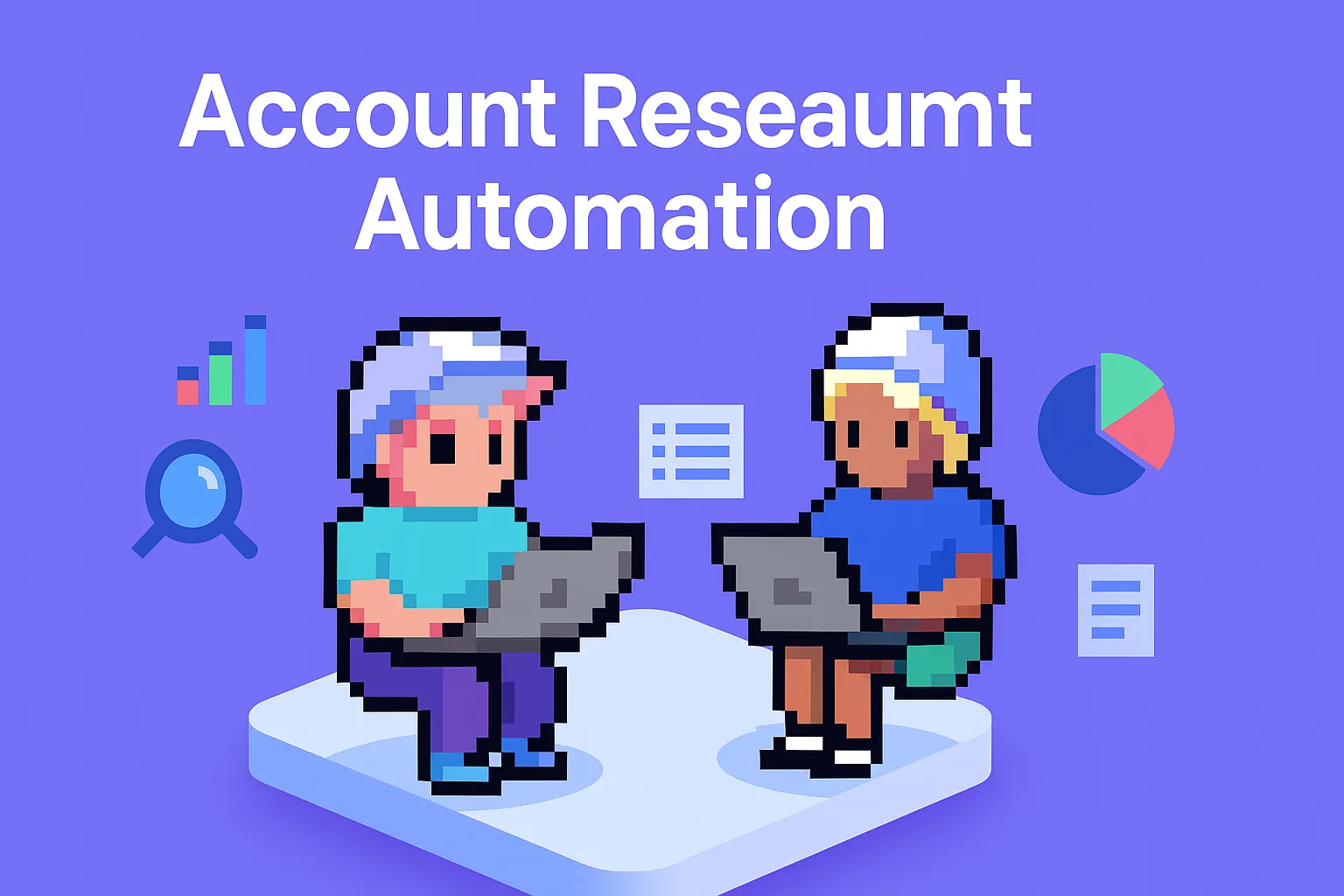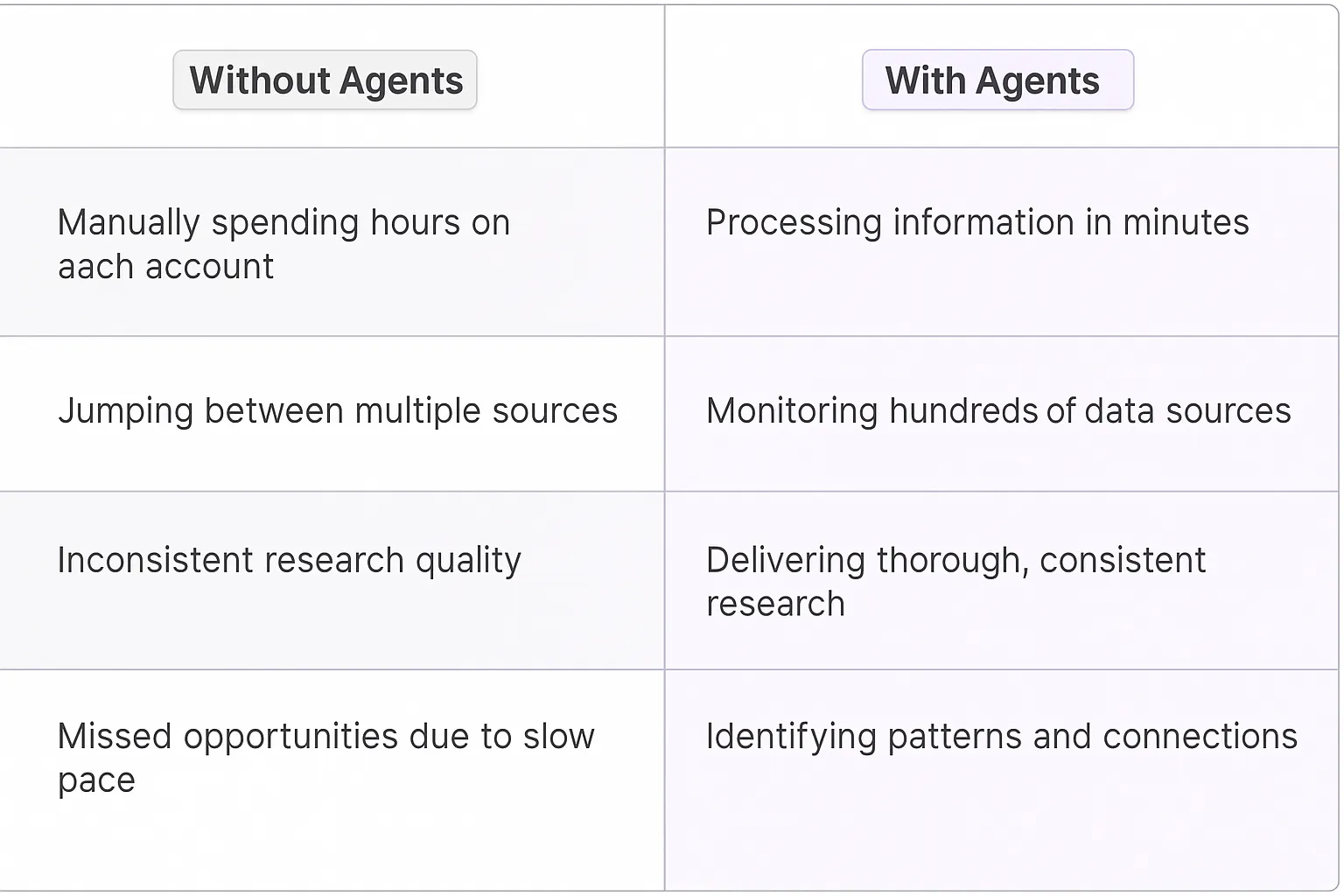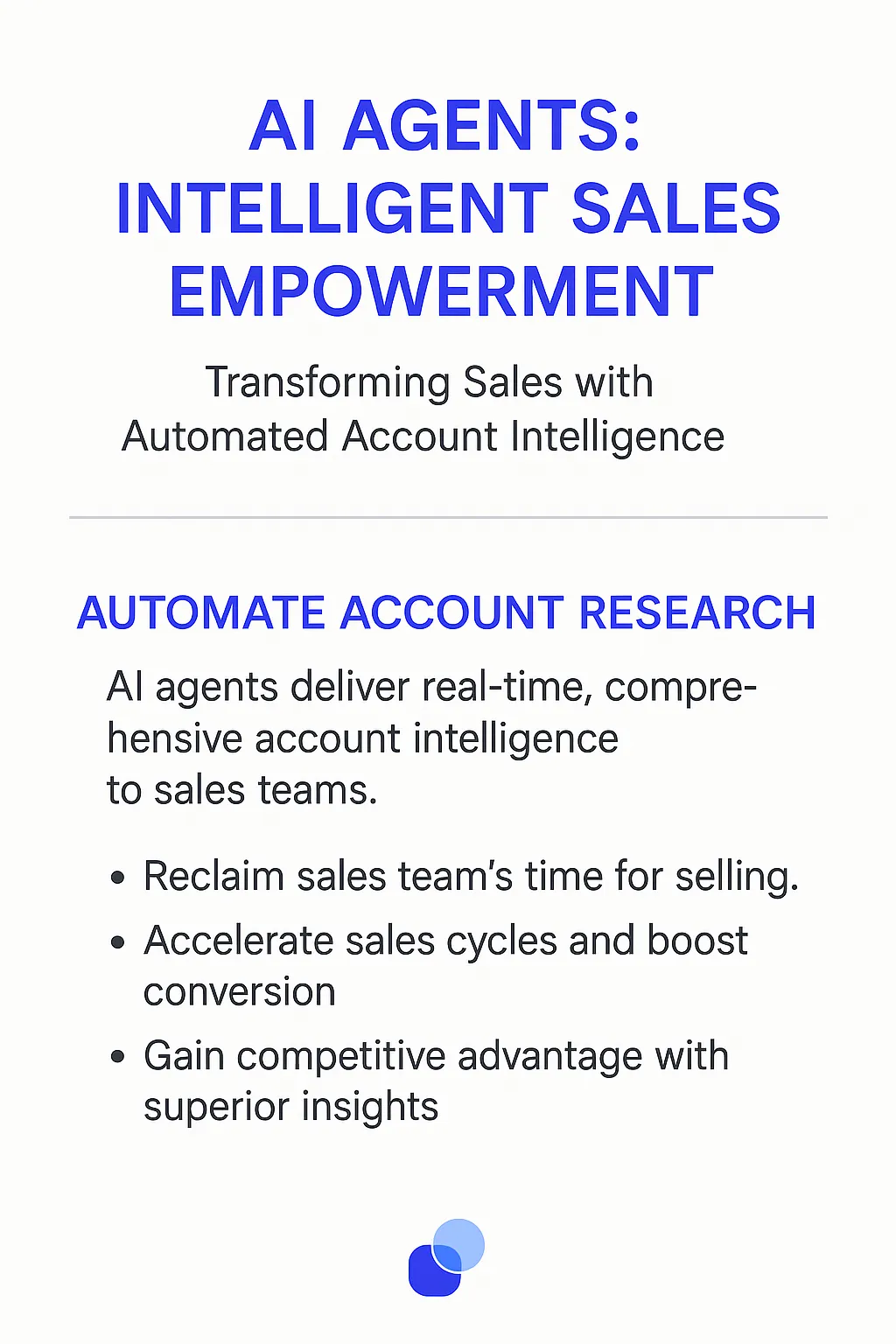Account Research Automation AI Agents
Understanding AI-Powered Account Research
What is Account Research Automation?
Account Research Automation leverages AI technology to autonomously gather, analyze, and synthesize intelligence about target companies and markets. Unlike traditional manual methods, these digital teammates work continuously in the background, processing information from multiple sources simultaneously. They transform raw data into actionable insights, identifying patterns and connections that would be impossible to spot through human analysis alone.
Key Features of Account Research Automation
- Autonomous Data Collection: Continuous monitoring of news, financial reports, social signals, and market trends
- Intelligent Pattern Recognition: Identification of non-obvious connections and emerging trends across datasets
- Real-time Updates: Instant alerts about significant changes or trigger events
- Multi-source Analysis: Simultaneous processing of hundreds of data sources
- Adaptive Learning: Continuous improvement through pattern recognition and feedback loops

Benefits of AI Agents for Account Research
What would have been used before AI Agents?
Sales teams traditionally spent countless hours manually piecing together account intelligence. They'd jump between LinkedIn, company websites, news articles, and financial databases - copying, pasting, and synthesizing information into CRM systems. The reality was brutal: a single thorough account research session could eat up 2-3 hours of a rep's day. That's time they weren't spending actually talking to prospects or closing deals.
The manual approach led to inconsistent research quality, missed opportunities, and the classic problem of different team members duplicating work because there wasn't a central source of truth. Sales ops teams tried to solve this with VA services and basic automation tools, but these solutions just shifted the manual work rather than eliminating it.
What are the benefits of AI Agents?
AI Agents fundamentally transform account research by operating as autonomous digital teammates that can process, analyze, and synthesize information at machine scale while maintaining human-like judgment. The network effects here are fascinating - each piece of research the AI Agent performs makes it smarter about industry patterns and company relationships.
The core benefits break down into three key areas:
- Speed and Scale: What used to take hours now happens in minutes. AI Agents can simultaneously analyze hundreds of data sources, extract relevant insights, and package them into actionable intelligence.
- Pattern Recognition: AI Agents excel at identifying non-obvious connections between companies, market trends, and buying signals that humans might miss. They can spot when multiple companies in a sector start showing similar behavioral patterns that indicate readiness to buy.
- Consistency and Depth: Every piece of account research follows the same thorough process, eliminating the variability that comes with manual research. AI Agents maintain the same level of attention to detail whether it's their first or thousandth research task of the day.
The most interesting aspect is how this shifts the role of sales reps. Instead of being information gatherers, they become insight interpreters and relationship builders. The AI Agent handles the heavy lifting of data collection and initial analysis, allowing reps to focus on the high-value human elements of the sales process.

Potential Use Cases of Account Research Automation AI Agents
Account research automation transforms how sales and business development teams gather intelligence and qualify prospects. These digital teammates work continuously in the background, processing vast amounts of data to surface actionable insights about target accounts.
Processes
- Continuous monitoring of company news, funding rounds, and major business events
- Analysis of quarterly earnings reports and financial statements
- Tracking of key executive movements and organizational changes
- Identification of expansion opportunities within existing accounts
- Monitoring competitor activities and market positioning
Tasks
- Generating detailed company profiles with recent developments and growth indicators
- Creating summaries of earnings calls and investor presentations
- Identifying potential pain points based on public statements and news coverage
- Compiling industry-specific metrics and benchmarks
- Building relationship maps between decision-makers and influencers
- Flagging trigger events that indicate buying readiness
Real-World Applications
The most effective account research automation happens when AI agents operate as an extension of your existing workflows. For enterprise sales teams, these digital teammates can process hundreds of news sources, SEC filings, and social media updates daily - tasks that would typically consume 15-20 hours per week for each sales researcher.
Consider a B2B software sales team targeting Fortune 500 companies. Their AI agent monitors earnings calls, press releases, and industry news, then synthesizes this information into actionable intelligence. When a target account announces a digital transformation initiative or new CTO, the agent immediately alerts the sales team with relevant context and potential conversation starters.
Impact on Sales Operations
Sales teams using account research automation typically see a 60-70% reduction in research time while uncovering 3x more relevant insights. This shift allows account executives to focus on high-value activities like relationship building and deal strategy, rather than getting lost in the weeds of manual research.
The real power comes from the AI agent's ability to identify patterns across vast datasets. It might notice that companies typically become sales-ready within 90 days of specific trigger events, like expanding into new markets or launching digital transformation initiatives. This intelligence helps sales teams prioritize their outreach and customize their approach based on each account's current situation.

Industry Use Cases
Account research automation through AI agents represents one of those rare technological shifts that fundamentally changes how businesses understand and interact with their customers. The depth and speed at which these digital teammates can analyze account data creates opportunities that were previously impossible with manual research methods.
Looking across different sectors, we're seeing fascinating applications emerge. Financial services firms deploy AI agents to construct comprehensive client profiles by synthesizing data from SEC filings, news sources, and social signals. Sales teams in SaaS companies use them to identify expansion opportunities within existing accounts by analyzing product usage patterns and market dynamics. Even non-profits leverage these capabilities to better understand donor behaviors and giving potential.
What makes this particularly compelling is how AI agents adapt their research approach based on the specific industry context. They can shift from analyzing manufacturing supply chains to evaluating healthcare provider networks, maintaining relevance across vastly different business environments. This adaptability, combined with their ability to process information at scale, creates a new paradigm for how organizations understand and serve their accounts.
Real Estate: Transforming Property Research Through AI
Real estate firms face a massive data challenge - gathering accurate information about properties, owners, and market conditions across thousands of potential deals. The traditional approach of manually researching each property eats up countless hours that agents could spend building relationships and closing deals.
Account Research Automation AI agents fundamentally change this dynamic. When integrated into a real estate firm's workflow, these digital teammates can continuously monitor and analyze property records, ownership history, tax assessments, and market comparables across multiple databases simultaneously.
The depth of research goes far beyond surface-level data. These AI agents can identify patterns like properties approaching their typical sale cycle, owners with multiple holdings who may be interested in portfolio deals, and early indicators of properties that might soon come to market. They cross-reference social media, news articles, and public records to build comprehensive profiles of property owners and their potential motivations.
What makes this particularly powerful is the compound learning effect. As the AI agent processes more properties and transactions, it develops an increasingly sophisticated understanding of market dynamics and owner behaviors. A process that used to take 4-5 hours per property now happens automatically in minutes.
The most successful real estate firms using these AI agents have seen their deal sourcing capacity increase by 5-7x while maintaining the same headcount. Their agents arrive at meetings with deep insights about properties and owners that give them a decisive edge in negotiations.
This isn't just about efficiency - it's about uncovering opportunities that would have been impossible to find through manual research. When you can analyze thousands of properties and owners simultaneously, you start seeing patterns and connections that reveal hidden gems in the market.
Investment Banking: Accelerating Deal Flow Analysis
Investment banking analysts typically spend 70% of their time gathering and organizing data about potential deals and target companies. This creates a massive bottleneck in deal flow, limiting the number of opportunities banks can seriously evaluate.
Account Research Automation AI agents are transforming this landscape by taking on the heavy lifting of initial company research and analysis. These digital teammates continuously scan financial statements, market reports, news coverage, and social signals across thousands of potential targets simultaneously.
The sophistication of this analysis goes well beyond basic financial metrics. The AI agents identify subtle indicators of company health like employee sentiment trends, patent filing patterns, and supply chain relationships. They track competitor movements and market dynamics that could impact valuations or deal timing.
One mid-sized investment bank implemented these AI agents and saw their deal evaluation capacity increase from 50 companies per quarter to over 300. The quality of analysis improved too - the AI spotted patterns across datasets that human analysts often missed, like early warning signs of management instability or hidden synergy opportunities.
The most interesting aspect is how this changes the role of junior bankers. Instead of drowning in spreadsheets, they're now focusing on relationship building and strategic analysis. The AI handles the grunt work, surfacing the most promising opportunities and providing rich context for human decision-making.
The network effects are particularly powerful here. Each deal the AI analyzes makes it smarter about industry dynamics and valuation drivers. Banks using these systems are building proprietary databases of deal insights that compound over time, creating sustainable competitive advantages in their target sectors.
This shift represents a fundamental evolution in how investment banks source and evaluate deals. The combination of tireless AI research capabilities with human strategic judgment is creating a new playbook for modern banking.
Considerations & Challenges
Technical Integration Hurdles
Building account research automation requires careful navigation of several technical complexities. Data quality stands as the primary challenge - AI agents need pristine, well-structured data to generate meaningful insights. Many organizations struggle with fragmented customer data spread across CRMs, spreadsheets, and legacy systems. The AI needs to gracefully handle incomplete or inconsistent information while maintaining accuracy.
Data Privacy & Security
Account research involves processing sensitive business information, making privacy protection critical. Organizations must implement robust security protocols, including encryption, access controls, and audit trails. The AI agent needs clear parameters about data handling, especially when dealing with regulated industries or international privacy laws like GDPR.
Training & Change Management
Sales teams often develop their own research methods over years of experience. Introducing an AI agent requires thoughtful change management. Teams need training not just on using the tool, but on interpreting AI-generated insights and understanding its limitations. The key is positioning the AI as an enhancement to human expertise, not a replacement.
Quality Control & Oversight
Account research automation demands ongoing monitoring and refinement. Organizations need processes to validate AI outputs, catch errors, and improve accuracy over time. This includes regular audits of research quality, feedback loops from sales teams, and mechanisms to handle edge cases where the AI might struggle.
Integration with Existing Workflows
The AI agent must fit seamlessly into current sales processes. This means careful API integrations with existing tools, customized output formats, and alignment with sales methodologies. The goal is to reduce friction rather than create additional steps for sales teams.
Cost-Benefit Analysis
While automation promises efficiency gains, organizations need clear metrics to measure ROI. This includes tracking time saved, research quality improvements, and impact on sales outcomes. The initial investment in AI technology and ongoing maintenance costs must be weighed against tangible business benefits.
The Future of AI-Powered Market Intelligence
Account Research Automation through AI Agents marks a pivotal evolution in how organizations understand and engage with their markets. The technology's ability to process vast amounts of data while maintaining contextual understanding creates unprecedented opportunities for businesses to make smarter, faster decisions. As these systems continue to evolve, they're not just changing how we do research - they're fundamentally transforming how organizations compete and win in their markets. The future belongs to companies that effectively combine AI-powered intelligence with human strategic thinking.













